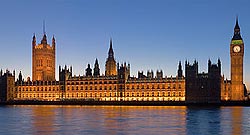WPP's HQ Moves From Dublin To London
- by Steve McClellan @mp_mcclellan, August 30, 2012
 WPP said Thursday that the company’s board of directors has approved a plan to return the company’s headquarters to London from Dublin, where it had moved four
years ago to avoid huge tax increases. But now UK tax policies have been changed, favoring UK companies that do a lot of business overseas.
WPP said Thursday that the company’s board of directors has approved a plan to return the company’s headquarters to London from Dublin, where it had moved four
years ago to avoid huge tax increases. But now UK tax policies have been changed, favoring UK companies that do a lot of business overseas.
“The United Kingdom Coalition Government
has now enacted legislation covering the taxation of foreign profit from 2013,” the holding company stated. “This will mean that, at least for the life of this Government, there will be no
tax cost to the Group by returning its headquarters to the United Kingdom from Ireland.”
By moving to Dublin at the end of 2008, the company avoided huge tax increases imposed on the
foreign earnings of UK companies. By some estimates, WPP’s taxes would have risen 50% had it not made the move.
Under the new tax laws, UK companies will pay significantly less tax on
revenues derived by subsidiaries that they control and operate in foreign countries.
Earlier this year, WPP CEO Sir Martin Sorrell said the company would return its headquarters to the UK
if the British Government enacted the desired tax legislation, which is now scheduled to go into effect in 2013.
The move also must be approved by the company’s shareholders. WPP said
that it was scheduling a special meeting in December for shareholders to vote on the proposed return to London.
Some of the shareholders may not be thrilled with one of the tradeoffs of the
relocation. WPP acknowledged that the move will result in the loss of its scrip dividend alternative, which provides shareholders an opportunity to invest all or part of their cash dividend payments
in additional WPP shares, thereby avoiding certain taxes and dealer expenses.
The loss of the scrip dividend alternative, WPP stated, “will affect UK tax-paying individual share
owners the most.”
Tax savings aside, the move to Dublin was largely symbolic. The board of directors was legally required to conduct some meetings there, but it didn’t affect
the company’s day-to-day operations in a major way.
advertisement
advertisement


